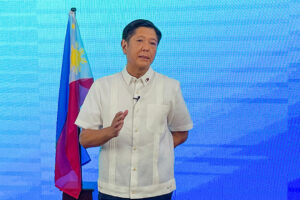[B-SIDE Podcast] Philippines, Taiwan, and the uncertain future

Follow us on Spotify BusinessWorld B-Side
The Philippines is so close to Taiwan that, as the old joke suggests, one could swim across the Bashi Channel to get there. Their connection goes beyond that, with the future of their geopolitical fates in question.
In this B-Side episode, Girard Mariano L. Lopez, a Filipino student in Taiwan and representative of the Asian pro-democracy group Milk Tea Alliance, discusses with BusinessWorld reporter Beatriz Marie D. Cruz how activists from the Philippines and Taiwan see the tensions with China.
“Taiwanese activists and Filipino activists here, obviously, support the Filipino victory within the Hague and the South China Sea,” Mr. Lopez, said, citing the 2016 landmark ruling by a United Nations-backed arbitration court that voided China’s claim over most of the South China Sea.
As a Filipino in Taiwan, Mr. Lopez said that the Philippines’ tricky relationship with China and the United States is something to watch out for.
President Ferdinand R. Marcos, Jr.’s granting of additional military bases to the US through the Enhanced Defense Cooperation Agreement (EDCA) is crucial, in particular, as some believe the EDCA sites could support Taiwan in case it is attacked by China.
Mr. Lopez noted the dilemma of allowing the US military’s soft power—in light of colonial baggage, environmental damage, and gender-based violence—in relation to the Philippines and US military bases that trace back to the Second World War, as well as the Visiting Forces Agreement (VFA).
Mr. Marcos has said that the EDCA sites won’t be used to attack neighboring countries.
CHINA-TAIWAN TENSIONS
China identifies the self-ruled Taiwan as a province that must be “unified” with the mainland.
In April, China’s Foreign Minister, Qin Gang, said that “those who play with fire on Taiwan will eventually get themselves burned.”
That same month, Chinese Ambassador Huang Xilian asked the Philippines to oppose Taiwan’s independence if the country “cares genuinely” about the welfare of more than 150,000 overseas Filipino workers there.
The Philippines remains subscribed to the One China Policy, which recognizes Taiwan as part of China.
However, Mr. Lopez said the Philippines could be missing out on several partnerships with Taiwan due to the One China Policy, which has limited relations to investment, trade, labor, and tourism agreements.
“There are some things that Taiwan and the Philippines could have more formally worked together on, especially on strategic alliances and the protection of their common territory,” he said.
Mr. Lopez added that official allies of Taiwan, like Belize and Guatemala, enjoy higher quotas for
scholarships dedicated to foreign students through Taiwan’s Ministry of Education and Ministry of Foreign Affairs.
On the flip side, Mr. Lopez noted that the European Union has kept its recognition of the One China Policy yet continued to build ties with Taiwan.
“These countries have taken the initiative to sort of move away from giving China those revenue streams and offering those to Taiwan as well. And I think that’s something the [Philippine] government [can bolster] in the future,” he said.
Mr. Lopez scored the need for Filipinos to also be more conscious of Taiwan’s situation with China, given that the Philippines’ ally, the US, is backing Taiwan, angering Beijing.
Both former US House Speaker Nancy Pelosi’s visit to Taiwan in Aug. 2022 and Taiwanese Vice President William Lai’s visit to the US in August this year were condemned by China, even calling Mr. Lai a “troublemaker.”
“Taiwan is our neighbor to the north and anything that happens to Taiwan will eventually trickle down towards the Philippines, especially if China launches a very brash offensive,” Mr. Lopez said.
He also emphasized the welfare of overseas Filipino workers who will be affected by an invasion. “There are more Filipinos that work in Taiwan than in mainland China itself.”
“Our kababayans loss of revenue or being able to fend for their family and their very lives [will be] endangered because bombs don’t discriminate when they land, as we see with the current Gaza crisis or with eastern Ukraine.”
Recorded remotely on Dec. 4, 2023.
Follow us on Spotify BusinessWorld B-Side




